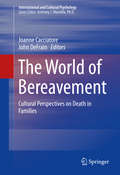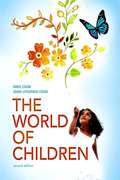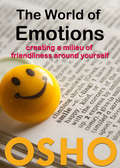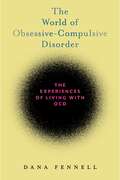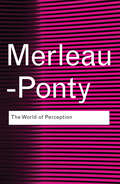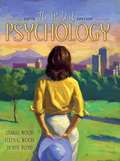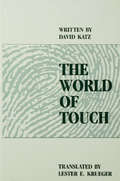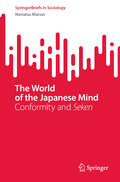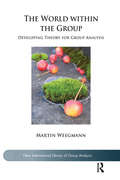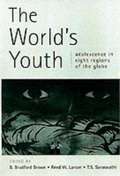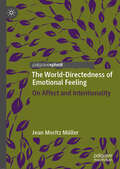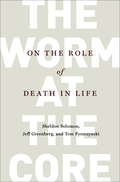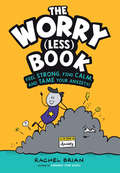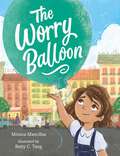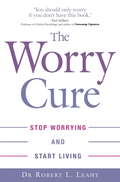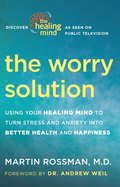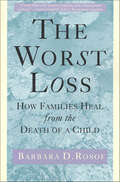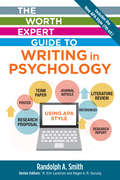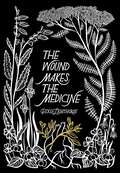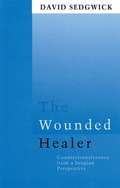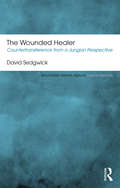- Table View
- List View
The World of Bereavement
by John Defrain Joanne CacciatoreThis visionary work explores the sensitive balance between the personal and private aspects of grief, the social and cultural variables that unite communities in bereavement, and the universal experience of loss. Its global journey takes readers into the processes of coping, ritual, and belief across established and emerging nations, indigenous cultures, and countries undergoing major upheavals, richly detailed by native scholars and practitioners. In these pages, culture itself is recognized as formed through many lenses, from the ancestral to the experiential. The human capacity to mourn, endure, and make meaning is examined in papers such as: Death, grief, and culture in Kenya: experiential strengths-based research. Death and grief in Korea: the continuum of life and death. To live with death: loss in Romanian culture. The Brazilian ways of living, dying, and grieving. Death and bereavement in Israel: Jewish, Muslim, and Christian perspectives. Completing the circle of life: death and grief among Native Americans. It is always normal to remember: death, grief, and culture in Australia. The World of Bereavement will fascinate and inspire clinicians, providers, and researchers in the field of death studies as well as privately-held professional training programs and the bereavement community in general.
The World of Children (2nd edition)
by Greg Cook Joan Littlefield CookFor the undergraduate child development course taught chronologically. The World of Children is chronological child development textbook by Joan Littlefield Cook and Greg Cook that helps students connect the science and the practice of child development in a way that can positively change lives. This exciting new text features an active learning system that exposes students to real people facing real world child development challenges, and encourages them to think critically about issues from multiple perspectives. The World of Children demonstrates the practical applications of child development through interviews with a diverse group of real parents and a variety of professionals who rely upon child development information in their jobs. Each chapter also spotlights the ways programs, laws, regulations, and other governing aspects of society can affect children. Looking for additional resources to help you understand the material and succeed in this course? MyDevelopmentLab contains study tools such as flashcards, self tests, videos, as well as MyVirtualChild which allows you to raise your own virtual child from birth through age 18 and monitor the results.
The World of Emotions
by Osho International Foundation OshoThe World of Emotions: A unique set of tools for everybody who is interested in improving human relations, and a great help in understanding where we are all coming from and what makes us tick. Full of simple, practical suggestions for creating a milieu of friendliness around yourself that is honest, sincere, and accepting of all our human frailties. One of the greatest challenges we face in life is learning how to handle and transform emotions. In this small book, Osho takes the reader step by step toward a deeper understanding of the inner world of emotions - where they come from, what types of situations can trigger them, and why they so often take us by surprise. We are taught that anger is bad, and we resolve not to be angry - but still it happens! Why is that? The first step in understanding is to identify and become aware of the conflicts between our intellectual understandings and the emotional realities that so often dominate our lives, between what we think and what we what we feel. Once the roots of this conflict are clearly seen and understood, the split can be healed. And the powerful life
The World of Obsessive-Compulsive Disorder: The Experiences of Living with OCD
by Dana FennellBeyond trivialization and misunderstanding, the realities of people experiencing OCD Obsessive-Compulsive Disorder (OCD) affects millions of people worldwide and looms large in popular culture, for instance when people quip about being “so OCD.” However, this sometimes has little relation to the actual experiences of people diagnosed with the disorder. In The World of Obsessive-Compulsive Disorder, Dana Fennell explores the lives of people who have OCD, giving us fresh insight into a highly misunderstood, trivialized, and sometimes stigmatized mental disorder that has no surefire cure. Drawing primarily on interviews with people who have OCD, Fennell shows us the diversity of ways the disorder manifests, when and why people come to perceive themselves as having a problem, what treatment options they pursue, and how they make sense of and manage their lives. From those who have obsessions about their sexuality and relationships, to those who check repeatedly to make sure they have not caused harm, she sheds light on the hopes, expectations, and difficulties that people with OCD encounter. Fennell reveals how people cope in the face of this misunderstood disorder, including how they manage the barriers they face in the workplace and society. An eye-opening read, The World of Obsessive-Compulsive Disorder encourages us to consider, empathize with, and take steps to improve the lives of people with mental health issues.
The World of Perception
by Maurice Merleau-Ponty'In simple prose Merleau-Ponty touches on his principle themes. He speaks about the body and the world, the coexistence of space and things, the unfortunate optimism of science – and also the insidious stickiness of honey, and the mystery of anger.' - James ElkinsMaurice Merleau-Ponty was one of the most important thinkers of the post-war era. Central to his thought was the idea that human understanding comes from our bodily experience of the world that we perceive: a deceptively simple argument, perhaps, but one that he felt had to be made in the wake of attacks from contemporary science and the philosophy of Descartes on the reliability of human perception.From this starting point, Merleau-Ponty presented these seven lectures on The World of Perception to French radio listeners in 1948. Available in a paperback English translation for the first time in the Routledge Classics series to mark the centenary of Merleau-Ponty’s birth, this is a dazzling and accessible guide to a whole universe of experience, from the pursuit of scientific knowledge, through the psychic life of animals to the glories of the art of Paul Cézanne.
The World of Psychology (5th edition)
by Samuel E. Wood Ellen Green Wood Denise BoydThe World of Psychology provides superior pedagogical support while making the connection between the scientific principles of psychology and the everyday lives of today's diverse student audience.
The World of Touch
by David KatzFor the first time, David Katz's classic monograph The World of Touch has been translated into English. Regarded as one of the premiere experimental psychologists, Katz vigorously opposed the atomism and "tachistoscopic" mentality typical of the sensory psychology of his day. In The World of Touch, Katz sought to dispel the invidious distinction between the supposedly higher (e.g., vision, audition) and lower (e.g., touch) senses. To help touch regain its original prominence in the field, Katz demonstrated, through very simple, yet creative experiments, how fascinating the abilities of touch are, and how valuable the tactual stimulus can be in specifying objects, surfaces, substances, and events. In addition, Katz emphasized the importance of higher-order invariants in the perception of objects, and the holistic quality of perception in time as well as space.
The World of the Japanese Mind: Conformity and Seken (SpringerBriefs in Sociology)
by Noriatsu MatsuiThis book investigates the source from which the pressure to conform arises in Japanese society. Even though the contemporary Japanese word for “society” (Shakai) has a history of 140 years, it does not include the concept of respecting the individual but refers mainly to social frameworks and institutional aspects. At the same time, the traditional Japanese terms for “society”, primarily Seken, that have been in use for 1,400 years have embraced human relationships of the members of the group.The hypothesis of this book is that there is no “society” as such in Japanese people’s minds. By proposing a new model (the Hand-Carved Tripod Model) of conformity in Japan, the book shows the structure of the pressure to conform. The tripod is composed of ambiguous words, the sense of belonging, and the “air”, or understanding, that represents the unwritten rules and regulations of Seken.Conformity in Japanese people’s minds takesdifferent forms, from small residential groups to corporations at work, and to nationwide associations, but always dictates that people follow everyone else in the organization.This book examines the sense of being blocked in Japan that has prevailed over 30 years, during the period of the so-called Three Lost Decades in Japan. Examining phenomena such as low worker engagement, karoshi (death by overwork), high middle-age male suicide rates, bullying in school and at work, sex discrimination, hereditary membership in the Diet, and failure to provide adequate protection for whistle-blowers, this book reveals a common structure in Japanese minds: lack of respect for individuality, and the traditional and narrow sense of the world, i.e., Seken.This book will be beneficial to scholars and graduate students as well as to businesspeople who are interested in understanding the behavior and minds of Japanese people from the psychological,cultural, and historical viewpoints. It provides an integrated view of Japan’s Seken as the platform that generates their conformity.
The World within the Group: Developing Theory for Group Analysis (The New International Library of Group Analysis)
by Martin WeegmannThe World within the Group is an original and ambitious endeavour to connect group analysis to philosophy, history, and modern social theory. The book argues that group analysis needs theoretical renewal to remain relevant, and that philosophy is a valuable resource for such thinking. In particular, the work of three philosophers is examined: Nietzsche, Dewey, and Gadamer, each being associated with "pragmatic-perspective" inquiry. The author demonstrates that group analysis is compatible with such inquiry, and that we understand and intervene from within the horizon of specific traditions of training and theory. Group analysis typifies an unremitting relational stance, valuing openness of dialogue, and moving in and out of the perspectival worlds of the participants. The book also offers a re-formulation of the concept of social unconscious, seen as a discursive world of production and articulation. Drawing on contemporary social theories, it chimes with the spirit of Elias's historical approach.
The World's Youth: Adolescence in Eight Regions of the Globe
by B. Bradford Brown Reed W. Larson T. S. SaraswathiThe life stage of adolescence now occurs in most corners of the world, but it takes different forms in different regions. Scholars from eight regions of the world describe the distinct nature of adolescence, drawing on research to address standard topics regarding this age and show how it has a different effect across societies. As a whole, the book depicts how rapid global change is dramatically altering the experience of the adolescent transition, creating new opportunities and challenges for adolescents, parents, teachers, and professionals.
The World-Directedness of Emotional Feeling: On Affect and Intentionality
by Jean Moritz MüllerThis book engages with what are widely recognized as the two core dimensions of emotion. When we are afraid, glad or disappointed, we feel a certain way; moreover, our emotion is intentional or directed at something: we are afraid of something, glad or disappointed about something. Connecting with a vital strand of recent philosophical thinking, Müller conceives of these two aspects of emotion as unified. Examining different possible ways of developing the view that the feeling dimension of emotion is itself intentional, he argues against the currently popular view that it is a form of perception-like receptivity to value. Müller instead proposes that emotional feeling is a specific type of response to value, an affective ‘position-taking’. This alternative conceives of emotional feeling as intimately related to our cares and concerns. While situating itself within the analytic-philosophical debate on emotion, the discussion crucially draws on ideas from the early phenomenological tradition and thinks past the theoretical strictures of many contemporary approaches to this subject. The result is an innovative view of emotional feeling as a thoroughly personal form of engagement with value.
The Worldly Philosophers: The Lives, Times and Ideas of the Great Economic Thinkers
by Robert HeilbronerAdam Smith, Malthus, David Ricardo, Karl Marx, Thorstein Veblen, John Maynard Keynes, and more...
The Worlds of Renaissance Melancholy
by Angus GowlandAngus Gowland investigates the theory of melancholy and its many applications in the Renaissance by means of a wide-ranging contextual analysis of Robert Burton's encyclopaedic Anatomy of Melancholy (first published in 1621). Approaching the Anatomy as the culmination of early modern medical, philosophical and spiritual inquiry about melancholy, Gowland examines the ways in which Burton exploited the moral psychology central to the Renaissance understanding of the condition to construct a critical vision of his intellectual and political environment. In the first sustained analysis of the evolving relationship of the Anatomy (in the various versions issued between 1621 and 1651) to late Renaissance humanist learning and early-seventeenth century England and Europe, Gowland corrects the prevailing view of the work as an unreflective digest of other authors' opinions, and reveals the Anatomy's character as a polemical literary engagement with the live intellectual, religious and political issues of its day.
The Worm at the Core: On the Role of Death in Life
by Jeff Greenberg Sheldon Solomon Tom PyszczynskiA transformative, fascinating theory--based on robust and groundbreaking experimental research--reveals how our unconscious fear of death powers almost everything we do, shining a light on the hidden motives that drive human behavior More than one hundred years ago, the American philosopher William James dubbed the knowledge that we must die "the worm at the core" of the human condition. In 1974, cultural anthropologist Ernest Becker won the Pulitzer Prize for his book The Denial of Death, arguing that the terror of death has a pervasive effect on human affairs. Now authors Sheldon Solomon, Jeff Greenberg, and Tom Pyszczynski clarify with wide-ranging evidence the many ways the worm at the core guides our thoughts and actions, from the great art we create to the devastating wars we wage. The Worm at the Core is the product of twenty-five years of in-depth research. Drawing from innovative experiments conducted around the globe, Solomon, Greenberg, and Pyszczynski show conclusively that the fear of death and the desire to transcend it inspire us to buy expensive cars, crave fame, put our health at risk, and disguise our animal nature. The fear of death can also prompt judges to dole out harsher punishments, make children react negatively to people different from themselves, and inflame intolerance and violence. But the worm at the core need not consume us. Emerging from their research is a unique and compelling approach to these deeply existential issues: terror management theory. TMT proposes that human culture infuses our lives with order, stability, significance, and purpose, and these anchors enable us to function moment to moment without becoming overwhelmed by the knowledge of our ultimate fate. The authors immerse us in a new way of understanding human evolution, child development, history, religion, art, science, mental health, war, and politics in the twenty-first century. In so doing, they also reveal how we can better come to terms with death and learn to lead lives of courage, creativity, and compassion. Written in an accessible, jargon-free style, The Worm at the Core offers a compelling new paradigm for understanding the choices we make in life--and a pathway toward divesting ourselves of the cultural and personal illusions that keep us from accepting the end that awaits us all.
The Worried Child: Recognizing Anxiety in Children and Helping Them Heal
by Paul FoxmanThe author discusses different anxiety disorders in children and how to treat them.
The Worry (Less) Book: Feel Strong, Find Calm, and Tame Your Anxiety!
by Rachel BrianThis is a book for people who worry. (So, yeah -- everyone!) We all have a mixture of fun and not-so fun feelings. And everyone feels worried sometimes. But too much anxiety can get in the way. So this book is here to help you identify your anxiety, understand why it's just part of that thing we call life, and equip you with all the tools you need to find calm again.Playfully presented, packed with fun and helpful illustrations, and expertly vetted, author-artist Rachel Brian (co-creator of the viral "Tea Consent" video) delivers a must-have book for anyone who wonders why they worry or how to better live with their anxiety. From recognizing when you're feeling anxious and worried, to taking charge by training your brain and using awesome techniques to help you feel good again, this book will have you worrying less and living more.
The Worry Balloon
by Mónica MancillasOn the first day of school, Isla’s mind plays the what if game. Scary thoughts come, the world goes dark, andeverything feels stormy. With Mami at her side, Isla takes a deep breath and blows her worries away in a big balloon. But as school gets closer, Isla’s worries come back like a tornado. Mami encourages her to imagine something happy, and Isla remembers there’s nothing she can’t handle.The storm might come again, but for now, her mind is quiet.In this thoughtful and reassuring picture book, Mónica Mancillas’s text and Betty C. Tang’s illustrations show how one child experiences anxiety and worry, providing different tools to practice mindfulness and strengthen one’s mental health.
The Worry Cure: Stop worrying and start living
by Dr Robert L. LeahyDo you worry that you'll say the wrong thing, wear the wrong outfit, or look out of place? Or maybe that you'll make a mistake at work, disappoint your partner, or overlook a serious health problem? Or perhaps you just worry too much - constantly running what-if scenarios through your head? Of course you do - we all do. Worry is a central issue in many people's lives; 38% of people say they worry every day. In this groundbreaking book, Dr Robert Leahy offers new insight, advice and practical techniques for everyone who has ever had a sleepless night. Using the most recent research and his 25 years of experience treating patients, Dr Leahy helps us understand why we worry and how best to defeat it. In his easy-to-follow-programme, he tells you how to: Identify productive and unproductive worry; Accept reality and commit to change; Turn 'failure' into opportunity; Use your emotions rather than worry about them. Combining stories from his practice with unique approaches to reducing worry, The Worry Cure is an essential companion for everyone who is anxious.
The Worry Solution: Using Breakthrough Brain Science to Turn Stress and Anxiety into Confidence and Happiness
by Martin RossmanOur brains are hardwired for worry. While our ancient ancestors had a legitimate use for the fight-or-flight instinct, today what was once a matter of survival has become the stuff of sleepless nights and anxiety-filled days. At its best, worry is a way for us to turn over and solve a problem in our minds. But for many, worry becomes a negative cycle of unnecessary suffering. Now, based on cutting-edge brain science, Dr. Martin Rossman has developed a program to help you break the worry cycle--and transform worry into a positive force. In The Worry Solution, Dr. Rossman gives you an easy-to-follow plan for taking control of your reactions to stress and anxiety. Using proven clinical techniques that harness the very power of imagination that creates worry and stress, you will learn the five basic skills that will help you to clarify your worries, sort them into those you can and cannot do something about, and tap the wisdom buried deep within you to help solve problems creatively. At the heart of the program is the use of guided imagery and creative visualization, techniques that invigorate the emotional and intuitive parts of the brain to add to and enhance logical intelligence. Not only can you start to see a change in your stress levels immediately, but with regular practice, you may literally alter the worry pathways in your brain--and "hardwire" yourself for calmness and clarity. Grounded in cutting-edge science and wonderfully accessible, The Worry Solution is a powerful and practical guide to living your best life--healthier, happier, and free from unnecessary stress.From the Hardcover edition.
The Worry Solution: Using Your Healing Mind to Turn Stress and Anxiety into Better Health and Happiness
by Andrew Weil Martin RossmanOur brains are hardwired for worry. While our ancient ancestors had a legitimate use for the fight-or-flight instinct, today what was once a matter of survival has become the stuff of sleepless nights and anxiety-filled days. At its best, worry is a way for us to turn over and solve a problem in our minds. But for many, worry becomes a negative cycle of unnecessary suffering. Now, based on cutting-edge brain science, Dr. Martin Rossman has developed a program to help you break the worry cycle--and transform worry into a positive force. In The Worry Solution, Dr. Rossman gives you an easy-to-follow plan for taking control of your reactions to stress and anxiety. Using proven clinical techniques that harness the very power of imagination that creates worry and stress, you will learn the five basic skills that will help you to clarify your worries, sort them into those you can and cannot do something about, and tap the wisdom buried deep within you to help solve problems creatively. At the heart of the program is the use of guided imagery and creative visualization, techniques that invigorate the emotional and intuitive parts of the brain to add to and enhance logical intelligence. Not only can you start to see a change in your stress levels immediately, but with regular practice, you may literally alter the worry pathways in your brain--and "hardwire" yourself for calmness and clarity. Grounded in cutting-edge science and wonderfully accessible, The Worry Solution is a powerful and practical guide to living your best life--healthier, happier, and free from unnecessary stress.From the Hardcover edition.
The Worst Loss: How Families Heal from the Death of a Child
by Barbara D. RosofThe death of a child is like no other loss. Barbara D. Rosof's The Worst Loss will help families who have experienced this to know what they are facing, understand what they are feeling, and appreciate their own needs and timetables.
The Worth Expert Guide to Writing in Psychology: Using APA Style
by Randolph SmithFilled with practical tips and advice, this brief and easy-to-use guide helps psychology majors write more effectively in the discipline. It’s a go-to resource for producing all kinds of writing projects (term papers, annotated bibliographies, literature reviews, research proposals, lab/research reports), with specific guidance on planning projects, developing topic ideas, avoiding grammatical errors, and formatting in APA style. This is a multipurpose book that will serve students throughout the academic and professional careers in psychology. The author provides suggestions for how to budget time for writing, how to plan writing sessions, and tips about problematic grammatical issues. The text addresses topics such as developing an idea for writing and explores the major types of writing assignments that students may face (i.e., term paper, annotated bibliography, literature review, research proposal, and lab/research report). The author also points out important differences in APA formatting for various types of assignments. This is a multipurpose book that will aid students regardless of the type of writing assignment they face—a good book to keep for all of their psychology career.
The Wound Makes the Medicine: Elemental Remediations for Transforming Heartache
by Pixie LighthorseA Simon & Schuster eBook. Simon & Schuster has a great book for every reader.
The Wounded Healer: Counter-Transference from a Jungian Perspective (Routledge Mental Health Classic Editions)
by David SedgwickCountertransference is an important part of the analytical process. It is concerned with the analyst's emotional response to the patient. As such, it can be a particularly difficult aspect of the analytical setting and especially so because of the threat of possible sexual involvement with the patient. At present there is little available on this difficult topic. Jungian analyst David Sedgwick tackles the subject bravely and shows how to use the countertransference in a positive way. The result is one of the finest Jungian clinical texts of recent years.
The Wounded Healer: Countertransference from a Jungian Perspective (Routledge Mental Health Classic Editions)
by David SedgwickIn the years since the publication of The Wounded Healer, countertransference has become a central consideration in the analytic process. David Sedgwick’s work was ground-breaking in tackling this difficult topic from a Jungian perspective and demonstrating how countertransference can be used in positive ways. Sedgwick’s extended study of the process candidly presents the analyst’s struggles and shows how the analyst is, as Jung said, "as much in the analysis as the patient." The book extends Jung’s prescient work on countertransference to create a dynamic view of the analyst-patient interaction, stressing the importance of the analyst’s own woundedness and how this may be used in conjunction with the patient’s own. Sedgwick begins with a discussion of the need and justification for a Jungian approach to countertransference, then reviews Jungian theories and presents detailed illustrations of cases showing the complexity of transference-countertransference processes in both the patient and the analyst, and concludes with a model of countertransference processing. This Classic Edition also includes a new introduction by the author. It will be an important work for Jungian analysts, psychotherapists and other clinicians and students interested in the struggles of the therapeutic process.
